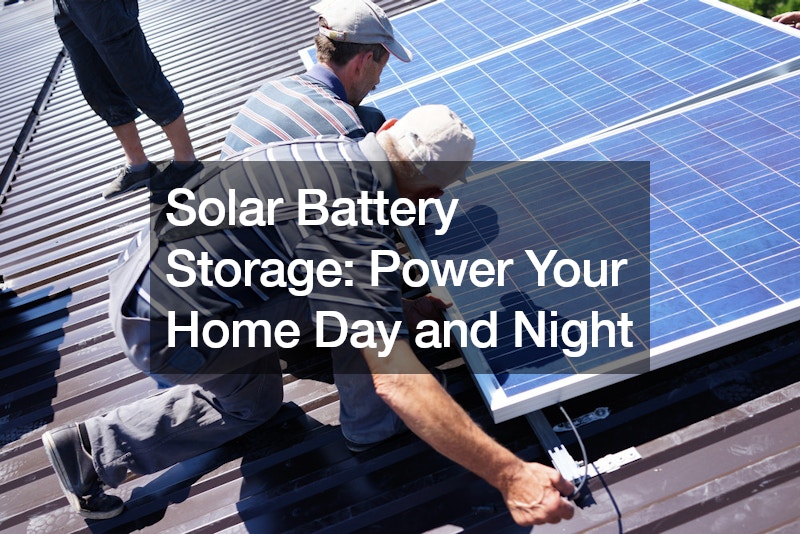Solar panels have become an increasingly popular way to generate clean, renewable energy for homes. However, a key limitation of traditional solar setups is that they only produce electricity while the sun is shining. This means you still rely on the grid for nighttime use and periods of low sunlight. Solar battery storage offers a solution, allowing you to harness the full potential of your solar panels and achieve greater energy independence.
How Traditional Solar Systems Work
A typical solar panel system consists of panels mounted on your roof that convert sunlight into direct current (DC) electricity. An inverter then converts the DC electricity to alternating current (AC) electricity, which is compatible with your home’s appliances.
During the day, when your solar panels are generating electricity, it powers your home directly. Any excess electricity produced beyond your immediate needs is typically sent back to the grid. Your utility provider may offer a net metering program, where you receive credits on your electricity bill for the excess power you contribute.
However, at night or during cloudy weather when your panels aren’t producing enough power, you draw electricity from the grid to meet your home’s needs. This means you’re still reliant on the traditional electricity system, and may not be fully capitalizing on the clean energy generated by your solar panels.
Enter Solar Battery Storage
Solar battery storage changes the game by allowing you to store excess solar energy generated during the day for later use. The battery system seamlessly integrates with your existing solar panels and inverter. Here’s how it works:
- Sun shines, panels generate electricity: As usual, your solar panels generate electricity during the day.
- Power your home directly: The electricity first meets the immediate needs of your appliances.
- Excess goes to the battery: Any surplus energy beyond your immediate needs is then directed towards charging your battery.
- Stored power for later: The stored solar energy in your battery becomes available for use at night or during low sunlight periods.
- Reduced reliance on the grid: With stored solar power, you become less reliant on the grid for your electricity needs.
Benefits of Solar Battery Storage
Installing a solar battery storage system offers several advantages:
- Increased self-consumption: You can use more of the solar energy you generate, reducing your dependence on the grid and potentially lowering your electricity bills.
- Greater energy independence: With stored solar power, you have a backup power source in case of grid outages, providing peace of mind during power cuts.
- Potential for time-of-use savings: Some utility companies offer time-of-use billing, where electricity rates are higher during peak usage hours. By using your stored solar energy during these peak periods, you can avoid expensive grid electricity.
- Environmental benefits: By relying less on grid electricity, you contribute to a cleaner and more sustainable energy future.
Things to Consider Before Installation
While solar battery storage offers significant benefits, there are some factors to consider before making a decision:
- Cost: Solar battery systems add an additional cost to your initial solar panel investment. However, with advancements in battery technology, the costs are steadily decreasing.
- Battery size: The size of your battery system will determine how much solar energy you can store. A larger battery allows for greater self-consumption but comes at a higher upfront cost. Consulting with a qualified electrician can help you determine the optimal battery size for your needs.
- Payback period: The time it takes to recoup the cost of your battery system through reduced electricity bills and potential incentives will vary depending on your energy usage and local utility programs.
Financing and Incentives
Several financing options are available for solar battery storage systems, including loans, leases, and power purchase agreements (PPAs). Additionally, some government and local incentive programs offer rebates or tax credits to offset the initial cost of battery systems. Researching available financing options and incentives in your area can make solar battery storage a more attractive financial proposition.
Installation Considerations
The installation process for solar battery storage typically involves a qualified electrician integrating the system with your existing solar panels and electrical system. The electrician will ensure the system meets all safety codes and operates efficiently. The specific installation process will vary depending on your existing setup and chosen system.
Conclusion
Solar battery storage is a powerful tool that allows you to maximize the benefits of your solar panels. With stored solar energy, you can achieve greater energy independence, potentially reduce your electricity bills, and contribute to a cleaner environment. While upfront costs are a factor, advancements in battery technology are making solar battery storage a more viable option for homeowners. Carefully considering the benefits and your specific needs, along with exploring financing options and incentives, can help you decide if solar battery storage is the right choice for powering your home day and night.
.


